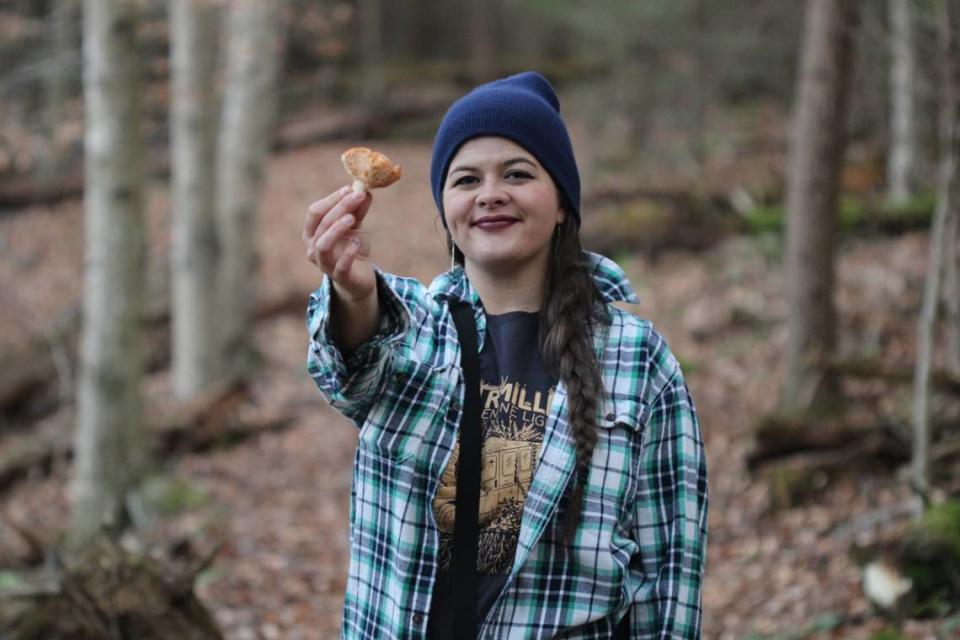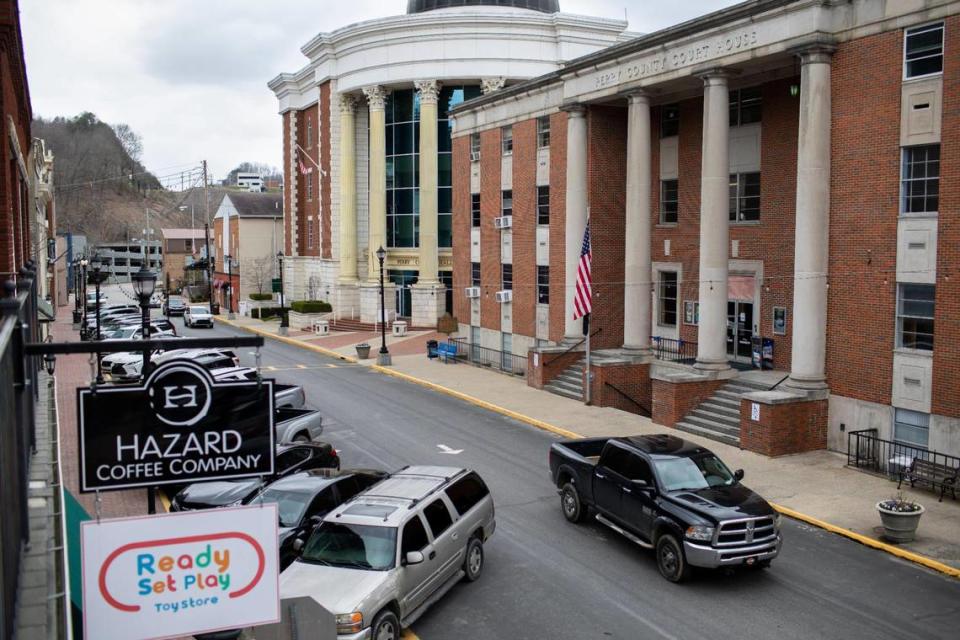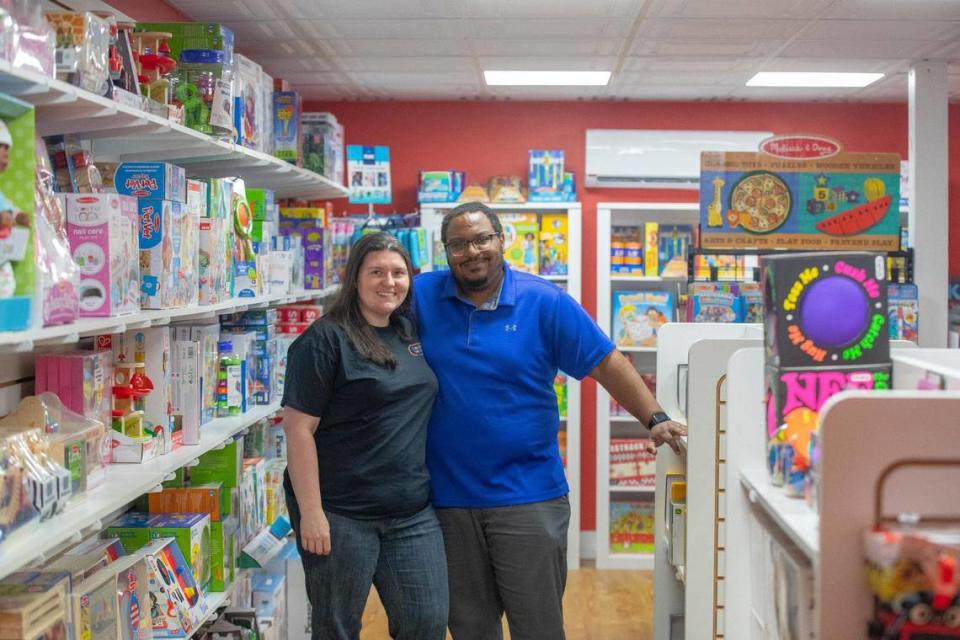An ‘Appalachian renaissance:’ Why these young people say they’re staying in Eastern Ky.
Whitney Johnson can’t imagine living anywhere else.
Eastern Kentucky, and more specifically Lawrence County, is home and she’s proud of that — so much so she has the word “Appalachian” tattooed on her arm.
“I’m branded now,” Johnson said. “I can’t move.”
Johnson shows the pride she has for her roots in more than just ink. She also broadcasts it to the over 740,000 followers that watch her TikTok account, appalachian_forager. As the name suggests, Johnson’s videos show her foraging for mushrooms and other local, edible plants — like papaws. She provides recipes for how to turn what she finds into products like dandelion jelly and Appalachian allspice. She also recently pet a possum.
Born and raised in Lawrence County, Johnson — a full-time therapist — said she got into foraging while in college at Morehead State University. The largest city she’s ever lived in is Huntington, West Virginia, but said she prefers the nature of her home county and the closeness of family and friends.
“That camaraderie is huge here,” Johnson said. “And a lot of times you’ll see on movies or in books, they’ll portray Appalachia as a place that you have to escape, you have to get out.”
Johnson, 33, didn’t get out and doesn’t plan on it. By doing so, she’s defying a narrative that is both real and perceived.
In the past half century, the population of Eastern Kentucky has largely decreased as the number of local jobs tied to the coal industry has plummeted. Lumped together, Kentucky’s 54 Appalachian counties lost 2.4% of their population — just over 29,000 people — between 2010 and 2020, census data compiled by the Appalachian Regional Commission shows. Meanwhile, the state’s non-Appalachian counterparts grew by 5%.
Worries over young people leaving the region and headlines warning of rural “brain drain” have accompanied population loss. Nearly every young person from Eastern Kentucky who was interviewed for this article said they’d grown up hearing a narrative they would need to leave the region in order to succeed.
That same group of young people — who have all established themselves in pursuits varying from entrepreneurship to TikTok fame — all said there is opportunity in Eastern Kentucky.
“If you ever want anything to happen good with your life, then honey leave the holler,” Johnson said, mimicking past advice. “...that’s fine, if that’s what you want to do. But I don’t think that that should be portrayed as the only option of success, is to leave a rural community because I mean, I love it.”

Pushing back against old narratives
In the past decade, Eastern Kentucky hasn’t seen the same amount of population decline as Appalachian counties in Ohio, Pennsylvania and West Virginia, which faced decreases of over 3% each. Appalachian New York, which actually has a population similar in size to Appalachian Kentucky, saw a 5.4% decline.
“In Eastern Kentucky in particular, it’s actually I think really a place of opportunity for educated youth who are encouraged to connect with where they’re from, and bring those skills in,” said Chris Green, the director of the Loyal Jones Appalachian Center at Berea College.
Students coming out of the region, at least that Green has met, might have more “baggage” related to home and might feel the need to distance themselves more from it. That baggage might come from national media narratives they’ve seen or from examples at home. In his work, Green said they try to help students embrace where they’re from and say “this is me, this is who I am.”
“When that happens, students light up brightly, to have this whole part of the self that they thought they would have to leave behind in terms of professionalism or in terms of worth and re-embrace it,” Green said.
Some study has been done on what might entice young people to stay in Appalachia. In 2008, researchers at Berea College surveyed 169 students who hailed from Appalachian counties in six different states on how likely they were to live in Central Appalachia after graduation and what factors might determine their decision.
The most important factors that might determine where a graduate chooses to live is the likelihood of them finding an interesting and challenging job that meets their salary desires and provides opportunities for advancement, found the study which was published in 2019 and authored by Caryn Vazzana, an economics professor at Berea.
Interestingly the study also found that students who came from counties considered more economically challenged were generally more likely to say they wanted to stay, “possibly indicating a higher attachment to the region.” Strong family ties also increased the attachment to Appalachia.
Policy makers, the study said, should “provide opportunities for such graduates to contribute to the socioeconomic development of their communities in rural Appalachia.”

In many ways, Luke Glaser, who is both a high school teacher and a Hazard city commissioner, is doing just that. His precalculus curriculum, he said, trains students to be problem solvers.
“We’re not in effect learning exponents because we’re going to use exponents when we get into our professional career,” Glaser said. “We’re learning exponents because we’re training our minds how to solve the big problems.”
So students talk about and analyze real-world problems in class. They read articles that talk of issues with local infrastructure, healthcare employment. They watch Diane Sawyer’s “Children of the Mountains.” Then they discuss what parts of those narratives are real or exaggerated. In the following semester, they engage in a project with a community member and attempt to solve a real problem.
“The dream is for them to get to understand a little bit about their community and develop a theory of change for it,” Glaser said. “But also to be motivated to push back against these narratives that they read about and saw in the videos.”
Glaser, 32, isn’t from Hazard. He grew up in Louisville with a lot of preconceptions about Eastern Kentucky he said he got from “what I had read or seen on TV.” He arrived in Perry County after accepting a Teach For America position after college. Originally he was only going to stay temporarily before heading to law school. A decade later, he still hasn’t gone to law school.
Perhaps among the greatest misconceptions surrounding the area is the idea that you have to leave to succeed, Glaser said.
Opportunity for anyone
Dylon Baker, a 22-year-old who grew up in the Perry County community of Chavies, knows that all too well. Growing up, he said he was asked if he was headed to Lexington or Louisville. But he stayed home, went to Hazard Community and Technical College and by age 20, Baker worked his way into becoming the youngest systems’ director in the history of the Appalachian Regional Healthcare.
“I knew I didn’t want to live in poverty any longer,” Baker said, crediting his ambitiousness to his upbringing. “I knew that there was a lot of barriers in the region. I grew up with family members who were in active addiction, alcohol and drugs. I saw the impact that had on our family.”
He said he wanted to show that anyone, no matter their socioeconomic background or other barriers, can succeed in Eastern Kentucky.

Stacie Fugate, 24, graduated from the University of Kentucky and immediately returned back home to Hazard to work. She’s been civically engaged since she was a teenager and is now the director of Invision Hazard, a nonprofit citizens’ action group that seeks to solve community problems. She also is the coordinator for the grassroots Appalachians for Appalachia.
Leaving the region to secure a better job was previously seen as a “mark of success,” Fugate said, but added that she had multiple people, many she works with now, trying to make sure she came back after college.

The next ‘Appalachian renaissance’
Fugate has been impressed with how many creators and artists that celebrate Appalachia have come forward, noting that in some instance, being Appalachian these days is “trendy.”
“I’ve always been proud to be Appalachian and so it’s really refreshing for me to see an uptick in how much people are interested in our culture,” Fugate said, noting that for so long Appalachians were looked down on or “othered.”
Glaser said in recent years, he’s noticed a sort of “Appalachian renaissance” amongst younger folks. He noted an increase in Appalachian media, books, stories and even apparel.
“Kids are certainly proud to be from here, they’re certainly thinking about what it means to be from here in ways that they weren’t 10 years ago,” Glaser said,
A pair of brothers in Rowan County certainly know about that. Six years ago, Joshua and Jared Ravenscraft started their own clothing brand in their garage. Today their business, New Frontier, has a Main Street location in downtown Morehead and a large warehouse in an old logging yard where they ship their brand around the world.

The clothing, they said, is somewhat like the popular athleisure style but “reimagined,” Jared said, adding that they like to call it “mountain leisure.” Much of their clothing, be it shorts, hoodies or shirts, celebrate Appalachia, Eastern Kentucky and Red River Gorge.
Starting a fashion brand outside of a larger city seemed near impossible, said Joshua, 26, but added that the modern landscape of e-commerce combined with the community rallying around their company made it more possible.
“Ultimately, they’re very much part of New Frontier as well,” Joshua said. “So when we took the jump to start a lot of these people here in Eastern Kentucky took the jump as well to kind of support us.”
There’s been an Appalachian Renaissance in the past, notably in literature and roughly centered around the 1970s, Green, an Appalachian Studies professor, said. He sees the modern iteration of that as a creative fire passed down over generations and is burning particularly bright right now.
“Now we see book after book coming out and people telling their story,” Green said. “We see amazing innovations. We see amazing restaurants opening up, we see people both embracing and working to belong, doing place creation.”
At 15 years old, Addyson Scott is looking to do that in Letcher County. Growing up there, “I always thought there was nothing to do,” Scott said, adding that as she’s gotten older “the more I realized I live in one of the most beautiful places on Earth.”
Scott has grown up around Pine Mountain, one of Kentucky’s highest points, where the view at sunset is “absolutely breathtaking.” She wants to make her community a “destination point.” In May, the high school sophomore is planning on opening her own ice cream shop, Scoops On The Pine, and she’s planning on employing local high schoolers or college students for the summer.
“With my business, essentially, I want people to come and hang out and make memories,” Scott said.
The shop will open next to the General Store at Pine Mountain Crossing, a community store opened by Scott’s parents, Tiffany and Ernie, in 2020. Ernie died unexpectedly March 12, but Addyson plans to still have the ice cream business, her mother said in a text message. “He was proud of her,” she said.

Coming home
Joey Jones, the owner of Ready Set Play, a toy store that he and his wife opened in downtown Hazard a little over a year ago, has found his hometown also supportive of a new local business. It’s been successful to the point that he’s been able to quit another job he had and focus on his dream full time.
“We always kind of joked like, hey, we should open a toy store and then those jokes and initial conversations became more serious,” Jones said. “And then we start involving family and friends in those conversations, and then it kind of just snowballed from there.”
But Jones, 38, hasn’t always stayed home. After a stop in Richmond, he spent about a decade in Louisville. After spending many a weekend driving home so that his parents could see his children, he decided to move home in 2019. Jones said folks in Louisville couldn’t quite wrap their heads around why he wanted to return.
Sarah Ratliff, a Pike County native, said she got a similar reaction when she opted to move home from the state’s largest city just last year.
“I wanted really badly to be out of Eastern Kentucky when I was younger, just because I wanted to experience the world, you know,” said Ratliff, who is a professor of social work at the University of Pikeville. “I didn’t hate my hometown, but I wanted to see more of the world.”
She doesn’t regret the move and said it furthered her career, but in Louisville she became the “token Appalachian hillbilly at whatever workplace I was at.”
“I’ve been made fun of,” Ratliff, 33, said. “Just boldly made fun of to my face for my accent or for just, you know, general stereotypes about people from Eastern Kentucky.”

A safe space in the mountains
The mountains are home, a place where Ratliff always felt safe and she returned home with hopes of making sure everyone in the mountains had a safe space.
“When I was about 29, or 30, I came out of the closet and started living my life a little more authentically,” Ratliff said. “I’ve been a loud and proud member of the LGBTQ community since then, and so now what brings me back is, I want to create the community that I needed when I was younger and I’m in a position to do that now.”
Ratliff, who is a board member with Pikeville Pride, said growing up she had no openly queer people around who she could talk to. She wants to be that for others.
“If we’re talking long term goals, my overarching goal is to be able to have a physical, safe space for queer people to go to in Pikeville to have like a drop-in center where they can go for support and resources and just to spend safe, sober time together,” Ratliff said. “That is the community I desperately want to create, but I got to start by changing some minds, I think.”
Fugate said she wants people to see that Eastern Kentuckians are aware there are tough issues locally and they’re working on solutions. She said one of the biggest misconceptions about Eastern Kentucky is that there’s no work being done to better it and that they “turn a blind eye to our problems.”
“I think it’s a huge milestone to be able to acknowledge that, yes, we do have problems like anywhere else in the world, we do have our issues,” Fugate said. “But oftentimes, there is a historical context that comes along with those issues. And we are working every single day, collectively to either reverse or mitigate the problems.”


